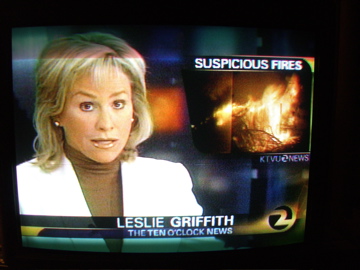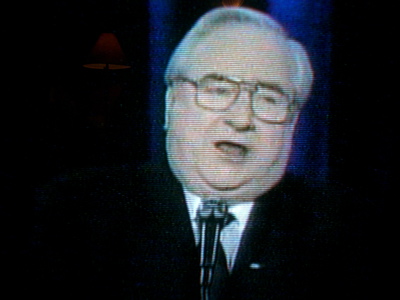
“An arsonist may be on the loose in Contra Costa County. We’ll tell you about the string of suspicious spires.”
The way it works with TV news shows and anchors is this: A group of writers and producers craft the bulk of the script for the hour or half-hour; the anchors appear on camera and read what has been written for them. The best anchors will write some of their own material. A competent one will go over the script before going on the air and perhaps work with producers or writers to tweak it.
One of the fun aspects of TV newswriting is to learn how the talent — the on-air people — read and talk. You learn by trial and error, by writing something that comes out sounding great or something that causes the talent to trip over the words. If you get to write for the same people long enough, the process is a little bit the way I imagine playwriting might be: The anchor or reporter becomes a character; when you write for them, you’re seeing and hearing them speaking the words on stage, as part of a dramatic production.
The goal in TV newswriting is short, straight-ahead sentences. They’re easy to read and understand. In my single on-air writing and editing gig, for TechTV’s “Tech Live” daily news show, I had to unlearn my habits of inserting all sorts of clauses and parenthetical comments into sentences. Not because TV news writing is dumber by nature, but because those kinds of sentences are harder to read aloud as they scroll up the teleprompter. Those clauses and asides become invitations to falter when they go from the page to oral delivery. That having been said, you learn which talent can handle a complex thought and sentence structure when it can’t be avoided and which ones can’t.
Which brings us to KTVU’s Leslie Griffith. (There’s nothing that makes her stand out from the mass of bad news anchors. She just happens to be one I see fairly often.) On one hand, you’ve got her trademark fumbles and stumbles; “suspicious spires” for “suspicious fires” right off the top of tonight’s newscast, for instance. On the other, you’ve got her tendency to plow through a story with odd pauses, misplaced emphases and out-of-breath gasps — the way most people would sound if they were reading something they had never seen before in public.
What does someone make for a performance like that? Well, the president of the United States makes $400,000 a year. Rumor has it that Leslie makes a quarter-million more than that, though I have to admit that despite her problems, she’s a better reader and hasn’t started a single war during her tenure.
Technorati Tags: berkeley, journalism, tv news

